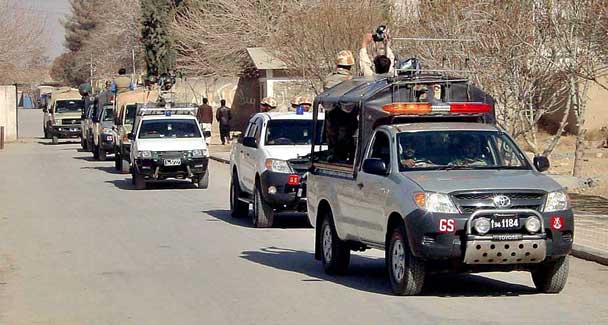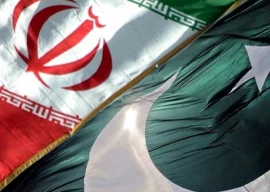
Ten terrorists were killed in a gun battle triggered by an intelligence-driven operation in a remote southern district of Balochistan, military’s media wing, the ISPR, said in a statement on Tuesday.
The intelligence-based operation (IBO) was conducted by the security forces in the Gwargo area of Awaran district, the ISPR said.
The raid was conducted based on information about the presence of terrorists responsible for an earlier deadly attack on the security forces in the area, it added.
“As soon as [the] security forces cordoned [off] the area, [the] terrorists opened fire to flee [under its cover] from area,” the ISPR said. “In [the ensuing] intense exchange of fire, 10 terrorists were killed.”
A cache of arms and ammunition was also recovered from the hideout.
“These terrorists were also involved in a firing incident on security forces which resulted in [the] martyrdom of Lance Naik Iqbal on December 20 in Awaran,” the military said.
Lance Naik Iqbal was hit during a search and clearance operation in the Jatt Bazaar area near Awaran which was conducted on the basis of intelligence about the presence of terrorists and their facilitators in the area.
The raid triggered a firefight between the security forces and the terrorists holed up in their hideout in the area. “Lance Naik Muhammad Iqbal was injured and immediately evacuated to Karachi where the brave soldier embraced Shahadat due to excessive bleeding,” the ISPR said at the time.
The entire Jatt Bazaar area was cleansed of terrorists.
Awaran is the home district of Dr Allah Nazar Baloch, the head honcho of Baloch Liberation Front, one of the several outlawed terrorist groups that have unleashed a bloody campaign in the resource-rich province.
Awaran, a dirt-poor district in the south of the impoverished Balochistan province, used to be a tehsil of Khuzdar district until 1992 when it was given the status of district.
Balochistan became a potpourri of sectarian, ethnic and militant violence which was exasperated by a bloody campaign of the outlawed Baloch terrorist groups.
These groups frequently attack national installations – including electricity pylons and railway tracks – and carry out ethnic killings in an attempt to scare people away from Balochistan, which is at the centre of a multibillion-dollar trade corridor being built by China.
India has openly opposed the gigantic infrastructure project, CPEC, which is part of China’s Belt and Road Initiative. And Pakistan believes that its arch-rival, in cohort with other hostile agencies, is fuelling terrorism in the province and elsewhere in the country by bankrolling these groups and by providing training to their fighters.
A commander of Indian navy Kulbhushan Jadhav was arrested in Balochistan while crossing over from Iran in March 2016. Jadhav, who worked for Indian spy agency RAW, admitted in a video confession that he was sent on a mission to stoke terrorism in Pakistan.
Subsequently, Jadhav was sentenced to death by a Field General Court Martial on 10 April 2017. India moved the International Court of Justice which, however, rejected India's plea for its spy’s release while asking Pakistan to review the trial and provide India with consular access.
On November 25, 2020, Pakistan handed over a dossier on India’s terror campaign to UN Secretary General Antonio Guterres, urging him to prevail on New Delhi to desist from its sinister activities.
The UN chief promised to “study the dossier and take appropriate action”. The dossier was also shared with Islamabad-based foreign envoys, including of veto-wielding powers in the UN Security Council.
1731570357-0/elon-musk-(1)1731570357-0-405x300.webp)
-(1)1717678110-0/Kendrick-(1)-(1)1717678110-0-165x106.webp)















COMMENTS
Comments are moderated and generally will be posted if they are on-topic and not abusive.
For more information, please see our Comments FAQ